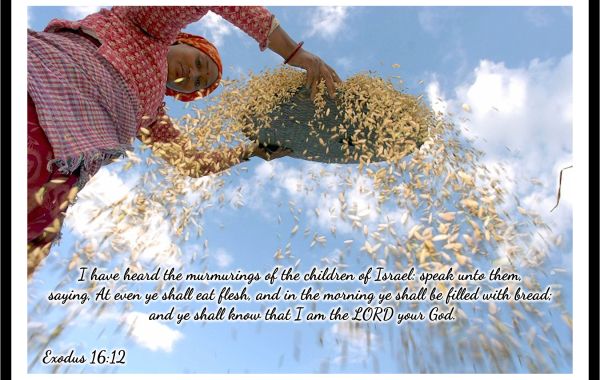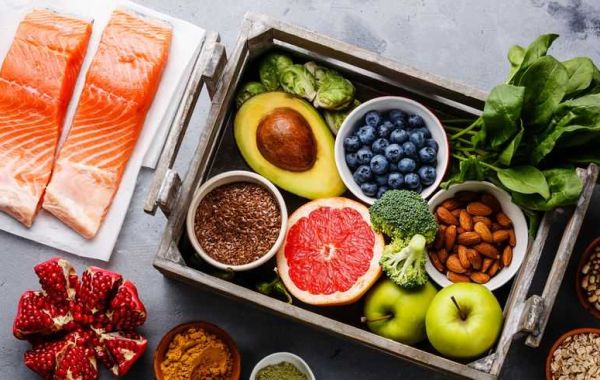And they took their journey from Elim, and all the congregation of the children of Israel came unto the wilderness of Sin, which is between Elim and Sinai, on the fifteenth day of the second month after their departing out of the land of Egypt.
Hebrew’s Need Met By God’s Provision
At this point in the Exodus narrative, the Hebrews have been on the road for 2 months. The supplies they had brough with them are running out and hunger is becoming a serious problem. There is no place to forage, hunt or fish. Even if they could do those things the logistics of hunting for over 2 million people would be impossible.
To feed 2.5 million people just two pounds of food and four pints of water per day would require around 2250 tons of food, and around 1.25 million gallons of water, per day! This does not take into account the fodder and water for their herds of sheep, goats, and cattle.
Over the forty years of the Exodus, it would have required at least 33 million tons of food and 18,000 million gallons of water just to sustain the people. In comparison, the miracle of parting the Red Sea doesn’t seem like that big a deal.
The Hebrews have not yet learned to put their full faith in God. They haven’t learned to be patient and wait on the Lord, but instead try to force their own will upon Him through Moses, to get what they need. They sound a lot like this generation.
Vs. 3 And the whole congregation of the children of Israel murmured against Moses and Aaron in the wilderness: And the children of Israel said unto them, Would to God we had died by the hand of the LORD in the land of Egypt, when we sat by the flesh pots, and when we did eat bread to the full; for ye have brought us forth into this wilderness, to kill this whole assembly with hunger.
They missed their fleshpots the Bible says. We would say they missed their crockpots and their instapots. The call out, complaining and wish that God had killed them back in Egypt, at least they would have died with a full belly. They fondly remember their slave food, but they conveniently forget their slave sorrow.
The LORD, despite their complaining, meets their need by sending bread from heaven in the morning and quails or partridges in the evening. Yet there is a condition, they must collect only as much as they can eat that day, except on Friday when they must collect twice the normal amount and most importantly they must not look for any manna on the Sabbath day. This is a test, God says, to see if the people will obey Him. Exodus 16:4 Behold, I will rain bread from heaven for you; and the people shall go out and gather a certain rate every day, that I may prove them, whether they will walk in my law, or no. vss. 11–12 And the LORD spake unto Moses, saying, I have heard the murmurings of the children of Israel: speak unto them, saying, At even ye shall eat flesh, and in the morning ye shall be filled with bread; and ye shall know that I am the LORD your God.
The bread from heaven and the quails from the wind that God sent was not a last-minute solution to an unforeseen crisis but was always what God had planned for the Hebrews as they traveled across the wilderness. The manna and quail was to be the daily proof of God’s providence for His own people according to His plan.
Blessings In Our Need
Today we also have needs as important as those of the Hebrews, needs in our family, our church, our finances, our health, or our future. We need to understand that God meets our needs according to His providence and that His providence today is as sufficient for us as it was in wilderness when He rained bread and blew in the quails.
Definition for Providence: We need a good definition of providence as a work of God.
It comes from the Latin, “Pro” means “before” and “video” means “to see” (did you know you were speaking Latin every time you say “Lets watch a vi-de-o on You-tu-beo. Rodeo, btw, in Latin means “watch where you step.” Google it when you get home.)
Providence, “to see before” in our relationship to God means He sees before the need and He plans to meet the need according to what He sees.
According to Biblical scholar Walter Brueggemann, providence is "the hidden, patient, sovereign enactment of God’s overriding purpose beyond the will and choice of human agents."
Theological Definition- Henry Thiessan “Lectures in Systematic Theology”
The Doctrine of Providence - The Christian view affirms that God has not merely created the universe, together with all its properties and powers, and that He is preserving all that He has created, but that as a holy, benevolent, wise and omnipotent being, He also exercises sovereign control over it. This sovereign control is called providence.
Etymologically, the word “providence” means foreseeing. From this basic idea has developed the meaning of providing for the future. But in theology the word has received a more specialized meaning. In this field, “providence” means that continuous activity of God whereby he makes all the events of the physical, mental, and moral realms work out His purpose, and this purpose is nothing short of the original design of God in creation. To be sure, evil has entered the universe, but it is not allowed to thwart God’s original, benevolent, wise and holy purpose.”
As you can see from that definition, trusting in God for our daily bread is but a small part of providence, though it may be the part that impacts me the most as it did the Hebrews. Hey, I also want and need my bread and quail, or tortillas and beef, today whatever the case may be. Even cornbread and armadillo as we found out last night.
But, we need a larger perspective of this great doctrine, we need to expand our faith by understanding it better. Yes, providence is trusting God for my needs today but even more importantly it is trusting God in His providence not just for me today but for all His people for all time and for all of eternity.








